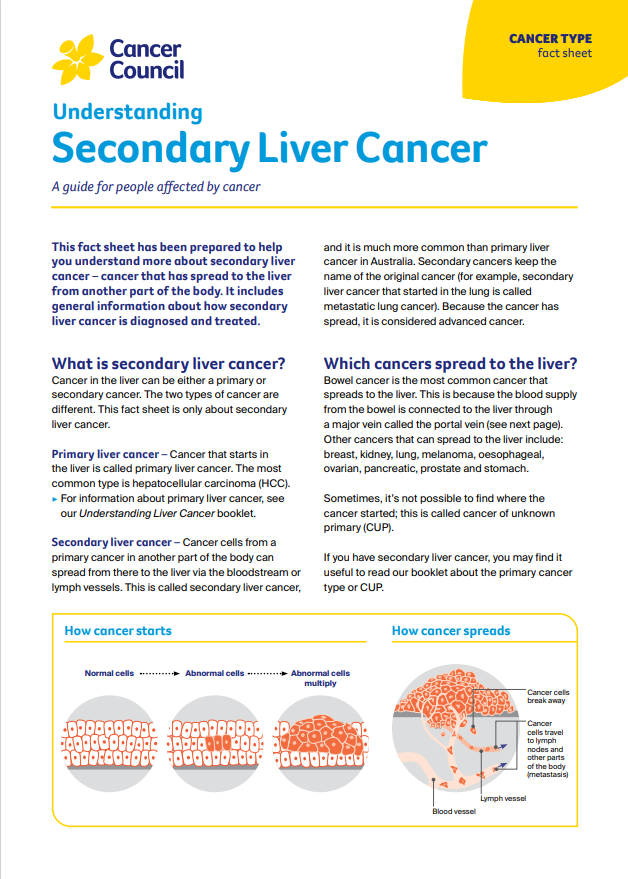- Home
- Secondary liver cancer
- Diagnosis
- Staging and prognosis
Staging and prognosis for secondary liver cancer
Once you have had tests that show you have cancer and whether it has spread, your doctor will tell you the stage of the cancer. Knowing the stage helps your health care team recommend the best treatment for you.
Learn more about:
Staging secondary liver cancer
Staging is the process of working out how far a cancer has spread through the body. Because the cancer has spread from another part of the body, secondary liver cancer is considered advanced cancer (also called stage 4 cancer).
The secondary cancer will be given a stage using the system for the primary cancer. For example, if it started in the bowel, it will often be staged using a system called TNM (tumour–nodes–metastasis).
For more information about staging, see information on the original cancer.
Prognosis
Prognosis means the expected outcome of a disease. You may wish to discuss your prognosis with your doctor, but it is not possible for anyone to predict the exact course of the disease.
To work out your prognosis, your doctor will consider factors such as:
- the type of primary cancer
- the size and number of cancers in the liver
- how fast the cancer is growing.
Your age, fitness and overall health will also affect your prognosis. Doctors often use numbers (statistics) when considering someone’s prognosis. While statistics give doctors a general idea about how a disease might progress, they won’t necessarily reflect your specific situation.
Although most cases of secondary liver cancer can’t be cured, surgery and other treatments can keep many cancers and symptoms under control for months or even many years. Read more about palliative treatment for secondary liver cancer.
For more on this, see our general sections on Palliative treatment and Living with advanced cancer.
→ READ MORE: Your health care team
Podcast: Tests and Cancer
Listen to more episodes of our podcast for people affected by cancer
More resources
Prof Desmond Yip, Senior Staff Specialist, Department of Medical Oncology, The Canberra Hospital, ACT (clinical update); A/Prof Siddhartha Baxi, Radiation Oncologist and Medical Director, GenesisCare, Gold Coast, QLD; Prof Katherine Clark, Clinical Director of Palliative Care, NSLHD Supportive and Palliative Care Network, Northern Sydney Cancer Centre, Royal North Shore Hospital, NSW; Anne Dowling, Hepatoma Clinical Nurse Consultant and Liver Transplant Coordinator, Austin Health, VIC; A/Prof Koroush Haghighi, Liver, Pancreas and Upper Gastrointestinal Surgeon, Prince of Wales and St Vincent’s Hospitals, NSW; Karen Hall, 13 11 20 Consultant, Cancer Council SA; Dr Brett Knowles, Hepato-Pancreato-Biliary and General Surgeon, Royal Melbourne Hospital, Peter MacCallum Cancer Centre and St Vincent’s Hospital, VIC; Lina Sharma, Consumer; A/Prof Simone Strasser, Head of Department and Hepatologist, AW Morrow Gastroenterology and Liver Centre, Royal Prince Alfred Hospital and The University of Sydney, NSW; David Thomas, Consumer.
View the Cancer Council NSW editorial policy.
View all publications or call 13 11 20 for free printed copies.

